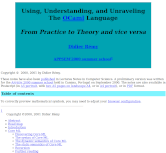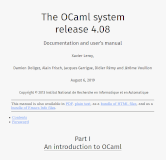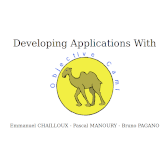Last Updated on June 28, 2024
4. Using, Understanding, and Unraveling The OCaml Language by Didier Rémy

Using, Understanding, and Unraveling The OCaml Language is a multi-dimensional presentation of the OCaml language that combines an informal and intuitive approach to the language with a rigorous definition and a formal semantics of a large subset of the language, including ML.
Throughout this book, the specific concepts and techniques are given rigorous theoretical justification. A sample of programming exercises with different levels of difficulty are included.
Chapters cover:
- Core ML – with examples, formalize a very small subset of the language, and shows how to derive other constructs remaining in core ML whenever possible.
- The core of OCaml – including type abbreviations, record types, mutable storage and side effects, and exceptions.
- The object layer – starts with an introduction to objects and classes, then presents the core of the object layer, and ends with a few advanced uses of objects.
- The module language – explores OCaml’s powerful module system.
- Mixing modules and objects – discusses the overlapping of features and the specificities, and show how to use them in harmony.
5. The OCaml system release 4.08 by Xavier Leroy, Damien Doligez, Alain Frisch, Jacques Garrigue, Didier Rémy and Jérôme Vouillon

The OCaml system release is the official User’s Manual. It serves as a complete reference guide to OCaml.
Updated for each version of OCaml, it contains the description of the language, of its extensions, and the documentation of the tools and libraries included in the official distribution.
The book covers:
- An introduction to OCaml – gives an overview of the language.
- The OCaml language – the reference description of the language.
- The OCaml tools – documents the compilers, top level system, and programming utilities.
- The OCaml library – describes the modules provided in the standard library.
6. Developing Applications With OCaml by Emmanuel Chailloux, Pascal Manoury and Bruno Pagano

Developing Applications With OCaml is divided into four main sections that build upon each other.
Each section has a set of chapters that present some related concepts, followed by an “Applications” chapter that uses those concepts to create a few small applications such as a minesweeper game, a graphical interface library, a couple of different two-player games, a distributed robot simulation, and a basic HTTP servlet.
The book explores:
- Language Core – complete presentation of the basic elements of the Objective Caml language looking into the functional core of the languages, a comparison between the “pure” functional and imperative styles, and the graphics library. This section then exhibits three applications: management of a simple database, a mini-Basic interpreter and a well-known single-player game, minesweeper.
- Development Tools – describes the various tools for application development including compilation modes, main libraries, garbage collection mechanism, the use of tools for debugging and profiling programs. Later chapters address lexical and syntactic tools, how to interface Objective Caml programs with C, constructing a library and an application.
- Application Structure – describes the two parts of organizing a program: with modules, and with objects.
- Concurrency and Distribution – introduces concurrent and distributed programs while detailing communication between processes, lightweight or not, and on the internet.
Pages in this article:
Page 1 – Real World OCaml and more books
Page 2 – Using, Understanding, and Unraveling The OCaml Language and more books
All books in this series:
| Free Programming Books | |
|---|---|
| Ada | ALGOL-like programming language, extended from Pascal and other languages |
| Agda | Dependently typed functional language based on intuitionistic Type Theory |
| Arduino | Inexpensive, flexible, open source microcontroller platform |
| Assembly | As close to writing machine code without writing in pure hexadecimal |
| Awk | Versatile language designed for pattern scanning and processing language |
| Bash | Shell and command language; popular both as a shell and a scripting language |
| BASIC | Beginner’s All-purpose Symbolic Instruction Code |
| C | General-purpose, procedural, portable, high-level language |
| C++ | General-purpose, portable, free-form, multi-paradigm language |
| C# | Combines the power and flexibility of C++ with the simplicity of Visual Basic |
| Clojure | Dialect of the Lisp programming language |
| ClojureScript | Compiler for Clojure that targets JavaScript |
| COBOL | Common Business-Oriented Language |
| CoffeeScript | Transcompiles into JavaScript inspired by Ruby, Python and Haskell |
| Coq | Dependently typed language similar to Agda, Idris, F* and others |
| Crystal | General-purpose, concurrent, multi-paradigm, object-oriented language |
| CSS | CSS (Cascading Style Sheets) specifies a web page’s appearance |
| D | General-purpose systems programming language with a C-like syntax |
| Dart | Client-optimized language for fast apps on multiple platforms |
| Dylan | Multi-paradigm language supporting functional and object-oriented coding |
| ECMAScript | Best known as the language embedded in web browsers |
| Eiffel | Object-oriented language designed by Bertrand Meyer |
| Elixir | Relatively new functional language running on the Erlang virtual machine |
| Erlang | General-purpose, concurrent, declarative, functional language |
| F# | Uses functional, imperative, and object-oriented programming methods |
| Factor | Dynamic stack-based programming language |
| Forth | Imperative stack-based programming language |
| Fortran | The first high-level language, using the first compiler |
| Go | Compiled, statically typed programming language |
| Groovy | Powerful, optionally typed and dynamic language |
| Haskell | Standardized, general-purpose, polymorphically, statically typed language |
| HTML | HyperText Markup Language |
| Icon | Wide variety of features for processing and presenting symbolic data |
| J | Array programming language based primarily on APL |
| Java | General-purpose, concurrent, class-based, object-oriented, high-level language |
| JavaScript | Interpreted, prototype-based, scripting language |
| Julia | High-level, high-performance language for technical computing |
| Kotlin | More modern version of Java |
| LabVIEW | Designed to enable domain experts to build power systems quickly |
| LaTeX | Professional document preparation system and document markup language |
| Lisp | Unique features - excellent to study programming constructs |
| Logo | Dialect of Lisp that features interactivity, modularity, extensibility |
| Lua | Designed as an embeddable scripting language |
| Markdown | Plain text formatting syntax designed to be easy-to-read and easy-to-write |
| Objective-C | Object-oriented language that adds Smalltalk-style messaging to C |
| OCaml | The main implementation of the Caml language |
| Pascal | Imperative and procedural language designed in the late 1960s |
| Perl | High-level, general-purpose, interpreted, scripting, dynamic language |
| PHP | PHP has been at the helm of the web for many years |
| PostScript | Interpreted, stack-based and Turing complete language |
| Prolog | A general purpose, declarative, logic programming language |
| PureScript | Small strongly, statically typed language compiling to JavaScript |
| Python | General-purpose, structured, powerful language |
| QML | Hierarchical declarative language for user interface layout - JSON-like syntax |
| R | De facto standard among statisticians and data analysts |
| Racket | General-purpose, object-oriented, multi-paradigm, functional language |
| Raku | Member of the Perl family of programming languages |
| Ruby | General purpose, scripting, structured, flexible, fully object-oriented language |
| Rust | Ideal for systems, embedded, and other performance critical code |
| Scala | Modern, object-functional, multi-paradigm, Java-based language |
| Scheme | A general-purpose, functional language descended from Lisp and Algol |
| Scratch | Visual programming language designed for 8-16 year-old children |
| SQL | Access and manipulate data held in a relational database management system |
| Standard ML | General-purpose functional language characterized as "Lisp with types" |
| Swift | Powerful and intuitive general-purpose programming language |
| Tcl | Dynamic language based on concepts of Lisp, C, and Unix shells |
| TeX | Markup and programming language - create professional quality typeset text |
| TypeScript | Strict syntactical superset of JavaScript adding optional static typing |
| Vala | Object-oriented language, syntactically similar to C# |
| VHDL | Hardware description language used in electronic design automation |
| VimL | Powerful scripting language of the Vim editor |
| XML | Rules for defining semantic tags describing structure ad meaning |
